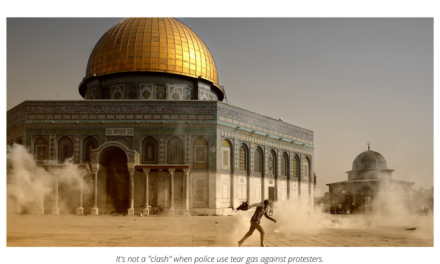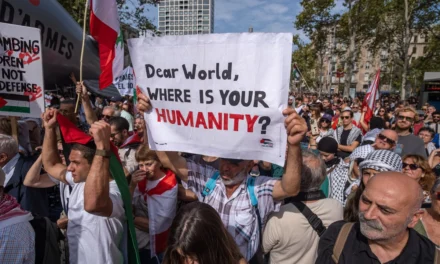New York Times headquarters
The annihilation of Gaza demands such urgent action from the world to save lives that observers often overlook an Israeli policy that is not directly murderous but plays a role in the destruction.
That is the policy of not allowing international reporters into Gaza. This policy is cruel and dehumanizing, and reminiscent of fascist restrictions on reporters. Though Palestinian reporters in Gaza have distinguished themselves in reporting from the strip, the Israeli policy is there for good reason– it has allowed Israel to get away with war crimes.
Tragically, the mainstream press rarely highlights the restriction, let alone denounces it. The Committee to Protect Journalists denounces the policy as an affront to democratic norms, and on his popular podcast, former Obama aide Tommy Vietor said that “it’s insane” that Israel does not allow reporters in and that “we should demand” that they be allowed. But those are blips.
The New York Times has not covered the restriction with any of the intensity it brought to Trump’s exclusion of the Associated Press from the White House last February. PEN America doesn’t talk about the Israeli policy. NPR has mentioned the restriction but failed to give it the outrage it deserves.
Our press has also failed to cover Israel’s slaughter of journalists with the outrage it deserves (even in “On the Media”). Israel has killed about 200 Palestinian journalists inside Gaza, and targeted leading intellectual figures such as Refaat Alareer, who was killed last year.
The importance of Israel’s media restrictions was driven home last week when staffers of the BBC, the Independent, and the New York Times flew over Gaza on Jordanian aid missions. The Times then published shocking images of urban areas reduced to complete rubble.
“When the rear cargo door opened, a devastated landscape was revealed,” the Times said.
Bel Trew of the Independent was horrified by what she saw, as she told the BBC: “Honestly it was chilling. The absolute destruction… looks like the bottom of a fire pit. … and tents all the way to the horizon.”
While Jeremy Bowen of BBC said that Israel had told the Jordanians not to allow reporters to film, a policy he condemned:
“The Jordanians have passed on a message from the Israelis. The Israelis don’t want us filming the devastation inside Gaza. But I’ve spent ten minutes looking at it with my own eyes and I can tell you that communities in the north of Gaza that I knew well, very vibrant, tens of thousands of people, living hard lives but actually with a remarkable human spirit– are flat. There’s nothing left of them.
“Now if you’ve been watching satellite imagery it won’t come as anything of a surprise. But seeing it is really something. Israel will not allow reporters like myself to enter Gaza to report the story, and they don’t want us to see it.”
There have been numerous statements from press organizations opposing the restrictions. The Washington Post has signed on to one, so have editors of the Times and NPR.
What is lacking is a campaign of public outrage and shaming, led by the press and joined by politicians.
Yes — Palestinian journalists in Gaza have shown incomparable courage and tenacity, and done stellar work to inform the world. But genocide deserves as much attention and as many perspectives as news organizations can supply. If the international press did gain access, the damage to Israel’s image and the pressure on it to stop committing crimes would surely grow. And Palestinian journalists would gain more protection against Israeli arms.
The lack of an outcry over the restrictions shows how much respect Israel maintains in the U.S. establishment in the midst of horrors experts say they have never seen. A “conveyor belt” of politicians is going into Israel right now, thanks to Israel lobby groups (reports one group’s leader, Jeremy Ben-Ami).
And Israel maintains prestige in the U.S. press. New York Times columnist David Brooks refers to Netanyahu as “Bibi” on PBS News Hour, a chumminess that no other brutal ethnic cleanser would be accorded. That broadcast and others treat Israeli leaders as trustworthy sources, when they are just like other war criminals who deny atrocities.
This week NPR gave a platform to retired Israeli general Amos Yadlin to spout falsehoods, such as the claim that genocide is only when half the people are killed.
“Israelis are fighting according to the international law. There is no more civilians killed in a ratio to the terrorist than the U.S. have done in Mosul in Iraq when they fought ISIS, or in Raqqa when they fought ISIS as well… Israelis are fighting according to the international law.”
The Bosnian Serbs also denied that they were committing genocide in Bosnia. Our press didn’t validate those lies, but then American reporters were witnesses to that genocide. Our press ought to demand access to this one.













